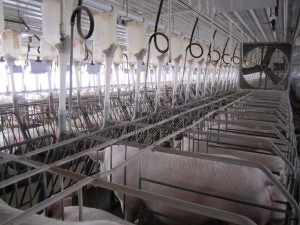Smithfield Foods is the target of an animal-rights lawsuit, which accuses the world’s largest pork producer of misleading consumers over how it treats animals in the U.S. food supply chain. The lawsuit, filed by the Humane Society of the United States, one of the most vocal animal-rights activist organizations in the country, accuses Smithfield of failing to eliminate gestation crates for mother pigs.
According to HSUS, the cages used to house the pigs are “barely larger than the animals’ own bodies and they prevent them from turning around.”
Public attitudes toward gestation crates have tended to be more negative than toward other similar types of confinement, such as farrowing crates. These latter crates, for example, are used in the hog industry because data show that sows inadvertently crush more than 100 million newborn piglets each year.
HSUS says that Smithfield never fully eliminated the gestation crates as the company said it would back in 2007, and HSUS is unhappy that that it appears Smithfield only reduced the amount of time it requires pigs to spend inside of them.
According to a screengrab from Smithfield’s website, the pork producer said that it has “transitioned all pregnant sows on company-owned farms to group housing systems globally.” It went onto to say that “we recommend our U.S. contract sow farms complete the same transition by the end of 2022.”
In 2018, The Virginian-Pilot reported that Smithfield Food “spent $360 million renovating its farms with the alternative ‘group-housing systems,’ which either keep the animals in pens or allow them to move freely between pens and individual stalls.” (The town of Smithfield, Virginia, is in part of the Pilot’s coverage area.)
At the time, animal-rights groups praised Smithfield Foods for its initiative, which was largely prompted by the restaurant chains and grocers that buy millions of pounds of meat every year, such as McDonald’s, Kroger, Burger King, Harris Teeter groceries, and Dunkin’ Donuts.
In documents shared with the media, HSUS didn’t reveal any new imagery or video, only showing visuals from a 2010 “investigation” that the organization conducted on a Virginia subsidiary farm of Smithfield’s. This was one of the images:

“Smithfield Foods misleads the public about how it treats its pigs,” said Kitty Block, president and CEO of the Humane Society of the United States. She said that the gestation crates “remain standard at Smithfield Foods despite its claims to the contrary, while the intelligent animals inside them cannot even turn around and gnaw on the bars of their crates until their mouths bleed. The public deserves to know the whole truth about the treatment of animals at Smithfield Foods, and our lawsuit intends to hold the company accountable.”
Block took over the organization in 2018, after then HSUS chief Wayne Pacelle was ousted over a wave of sexual misconduct allegations. HSUS has been given a “D” rating by CharityWatch, the nation’s premier charity watchdog, and it is continually known to actively go after livestock producers. (For reference, HSUS isn’t affiliated with local Humane Society groups.)
HSUS said that Smithfield repeatedly noted it was eliminating its use of these cages. HSUS cited these examples:
- In 2007, Smithfield Foods promised to phase out gestation crates on all company-owned farms within a decade, replacing the individual cages with a system where mother pigs are housed in groups. HSUS was not the only organization pressuring companies such as Smithfield to do away with this system.
- According to HSUS, Smithfield repeated claimed to be eliminating its use of these cages. The organization cited:
- Its 2007/2008 Corporate Social Responsibility report explicitly claimed the company was converting to gestation “stall-free” production.
- Its 2012 Integrated Report asserted that it was “eliminating” the use of gestation crates.
- A 2018 Smithfield Foods press release claimed: “Smithfield Foods delivers on decade-old promise to eliminate pregnant sow stalls in US.”
- In Smithfield Foods’ latest Sustainability Report, the company claims to “[m]aintain group housing for all pregnant sows on company-owned farms globally.”
HSUS claims that “Smithfield Foods’ ‘group housing’ system is actually just a cycle of crate confinement: it immobilizes pigs for up to six weeks at a time in gestation crates, only then moves them into group pens for as little as nine weeks, then moves them into farrowing crates for four weeks, and back into gestation crates. This cycle repeats for their whole lives — amounting to a small reduction but not elimination of gestation crate confinement as Smithfield Foods claims.”
Clarification (4:07 p.m. ET 10/19/21): This article was updated to clarify the perceptions and uses of different types of hog production crates.


